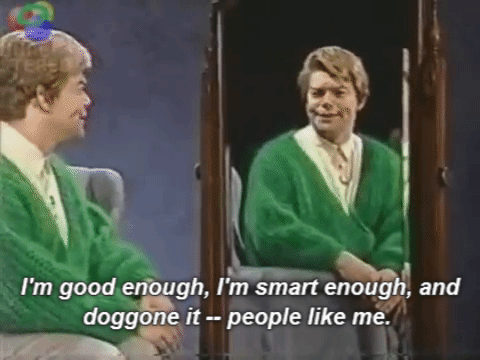Many people often experience an inner voice in their heads encouraging or discouraging them in their lives. This inner voice is known as self-talk and can be a coping strategy. We can be our own best cheerleader and our harshest critic. We can harness our self-talk to be kind, compassionate and encouraging to ourselves, but we need to be aware of these six harmful thinking styles:
Personalization
This is where a person believes everything is a reaction towards them and is their fault. They would take responsibility for things happening even if that isn’t the case. An example of this could be my roommate is upset, and it’s my fault because I didn’t spend enough time with them when their partner broke up with them. There could be many reasons, completely unrelated to me, to explain why they’re upset. Often with this thinking pattern, people take these personally and feel like they’re a result of their actions. In this case it may help to think about other reasons why something happened.
Another example is my boss didn’t smile at me today and she must be mad at me. This is a potential explanation, but maybe your boss just doesn’t smile a lot, maybe they’re wrapped up in personal issues and are focused on something else, or maybe they just didn’t see you. There’s a range of potential reasons as to why your boss isn’t smiling.
Jumping to conclusions
This is when a person assumes to know another person’s thoughts and feelings and the reasons behind their behaviour. As most of our communications are now virtual, I find myself falling into this thinking pattern. I find it easy to misinterpret a text or email and often remind myself I’m overanalyzing the interaction and don’t know how the person feels or what their intentions are.
For this case, it could be prevented by making phone calls or video calls to get audio and visual cues where possible. If you’re prone to jumping to conclusions, maybe that’s a conversation to have with those in your life about clear and direct communication.
Overgeneralization
This is when someone reaches a general conclusion based on a single event. It’s a habit that a lot of my friends in university tend to have. It’s when someone reaches a general conclusion based on a single event. For example, “I got a D on the last test. I will fail the course and school.” In this case, they’ve based their conclusion solely on one hard test.
This is an excellent example of where compassion is vital. Not everything will go well, and we have to give ourselves grace. Here we could change the thought to, “I didn’t do well on that test, but it’s not a representation of my abilities.” If this is something you commonly do, it may be helpful to use a simple mantra like, “I’m smart and capable and deserve to be here.”

Emotional reasoning
This is when we believe that what we’re feeling is true. This thinking pattern is not rational or based on logic but likely something many of us have done. When we feel intense emotions, it can be hard to separate our feelings from the truth.
Following the previous example where I got a D on a test, an emotional reasoning thinking pattern could be that, “I feel stupid and therefore am stupid.” This type of thinking is unkind towards yourself. This thinking trap may help us think about what we would do if a friend came to us with these thoughts. How would you respond if your best friend came to you saying, “I failed my test and I’m stupid?”
Filtering
This is a thinking trap where we focus on the negative details and amplify them instead of looking at the big picture or positives. It can sometimes be challenging not to fixate on the negatives, but it’s essential to see the whole picture. “I got an A on my test, but I got that hard question wrong.” In this case, I’m focusing on the one question I got wrong instead of my good grade or all the questions I got correct. This is another case where it can be helpful to think about how you would respond to a friend who felt like this.
Should statements
These are not compassionate, and if you haven’t done what you should have done, it can lead to a lot of guilt. Life is fast and busy. It’s essential to give ourselves grace and flexibility—something a should statement does not allow for. An example of this is, “I should have studied more, I shouldn’t be so lazy.” This could be changed to, “I studied hard, but next time I could start sooner or study more. I’m still a good student.”
Being aware of your self-talk can be challenging, and often it’s hard to notice. One way of doing this is by writing out some key negative messages you say to yourself frequently and coming up with positive alternatives. Just recognizing negative messages is a great start. If positive alternatives seem like too much of a challenge, try changing them to neutral messages or thinking about what your response would be if a friend said this.
But once you’re in the practice of catching yourself and changing negative statements into positive ones, I think you’ll see significant benefits. We can all afford to be a little more compassionate with ourselves.
Dalhousie's Stay Connected Mental Health Peer Support workers are here to support the Dalhousie community, and have our own personal experiences with mental health, allowing us to identify, relate to, and support other students. Find more info about how to connect with us here.

